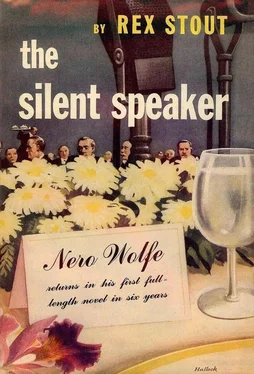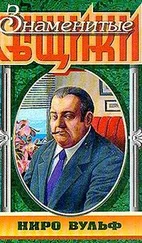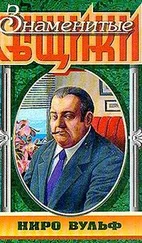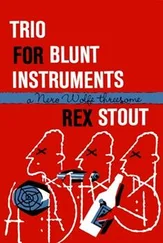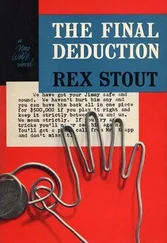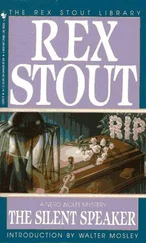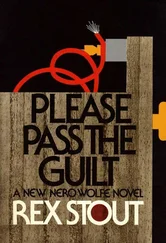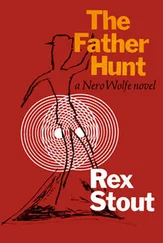“Mr. O’Neill.” Wolfe opened his eyes enough to see. “That tramping back and forth is extremely irritating.”
“I’m not going to leave this room,” O’Neill declared without halting.
“Shall I tie him up?” I offered.
Wolfe, ignoring me, told O’Neill, “It will probably be another hour or more. What about your statement that you got possession of this thing innocently? Your word. Do you want to explain that now? How you got it innocently?”
“I’ll explain it when I feel like it.”
“Nonsense. I didn’t take you for a nincompoop.”
“Go to hell.”
That always annoyed Wolfe. He said sharply, “Then you are a nincompoop. You have only two means of restraining Mr. Goodwin and me: your own physical prowess or an appeal to the police. The former is hopeless; Mr. Goodwin could fold you up and put you on a shelf. You obviously don’t like the idea of the police, I can’t imagine why, since you’re innocent. So how do you like this: when that machine has arrived and we have learned how to run it and the manager has departed, Mr. Goodwin will carry you out and set you on the stoop, and come back in and shut the door. Then he and I will listen to the cylinders.”
O’Neill stopped walking, took his hands from his pockets and put them flat on the desk to lean on them, and glowered at Wolfe.
“You won’t do that!”
“I won’t. Mr. Goodwin will.”
“Damn you!” He held the pose long enough for five takes, then slowly straightened up. “What do you want?”
“I want to know where you got this thing.”
“All right, I’ll tell you. Last evening—”
“Excuse me. Archie. Your notebook. Go ahead, sir.”
“Last evening around eight-thirty I got a phone call at home. It was a woman. She said her name was Dorothy Unger and she was a stenographer at the New York office of the Bureau of Price Regulation. She said she had made a bad mistake. She said that in an envelope addressed to me she had enclosed something that was supposed to be enclosed in a letter to someone else. She said that she had remembered about it after she got home, and that she might even lose her job if her boss found out about it. She asked me when I received the envelope to mail the enclosure to her at her home, and she gave me her address. I asked her what the enclosure was and she said it was a ticket for a parcel that had been checked at Grand Central Station. I asked her some more questions and told her I would do what she asked me to.”
Wolfe put in, “Of course you phoned her back.”
“I couldn’t. She said she had no phone and was calling from a booth. This morning I received the envelope and the enclosure was—”
“This is Sunday,” Wolfe snapped.
“Damn it, I know it’s Sunday! It came special delivery. It contained a circular about price ceilings, and the enclosure. If it had been a weekday I would have communicated with the BPR office, but of course the office wasn’t open.” O’Neill gestured impatiently. “What does it matter what I would have done or what I thought? You know what I did do. Naturally, you know more about it than me, since you arranged the whole thing!”
“I see.” Wolfe put up a brow. “You think I arranged it?”
“No.” O’Neill leaned on the desk again. “I know you arranged it! What happened? Wasn’t Goodwin right there? I admit I was dumb when I came here Friday. I was afraid you had agreed to frame Boone’s murder on someone in the BPR, or at least someone outside the NIA. And already, you must have been, you were preparing to frame someone in the NIA! Me! No wonder you think I’m a nincompoop!”
He jerked erect, glared at Wolfe, turned to glare at me, went to the red leather chair and sat down, and said in a completely different voice, calm and controlled:
“But you’ll find that I’m not a nincompoop.”
“That point,” Wolfe said, frowning at him, “is relatively unimportant. The envelope you received this morning special delivery — have you got it with you?”
“No.”
“Where is it, at your home?”
“Yes.”
“Telephone and tell someone to bring it here.”
“No. I’m going to have some detective work done on that envelope and not by you.”
“Then you won’t hear what those cylinders have to say,” Wolfe explained patiently. “Must I keep repeating that?”
This time O’Neill didn’t try to argue. He used the phone on my desk, dialed, got his party, and told someone whom he called Honey to get the envelope as described from the top of his chiffonier and send it by messenger to Nero Wolfe’s office. I was surprised. I would have made it five to one that there was no such envelope, and it was still even money with me that it would be gone from the chiffonier because it must have dropped to the floor and the maid thought it was trash.
When O’Neill was back in the red leather chair Wolfe said, “You’re going to find it a little difficult to get anyone to believe that you suspect Mr. Goodwin and me of arranging this. For if that’s true, why didn’t you insist on going to the police? He wanted to.”
“He did not want to.” O’Neill was keeping calm. “He merely threatened to.”
“But the threat worked. Why did it work?”
“You know damn well why it worked. Because I wanted to hear what’s on those cylinders.”
“You did indeed. Up to five thousand dollars. Why?”
“Do I have to tell you why?”
“No. You don’t have to. You know how it stands.”
O’Neill gulped. He had probably swallowed “Go to hell” thirty times in thirty minutes. “Because I have reason to suppose, and so have you, that they are confidential dictation by Cheney Boone, and they may have something to do with what happened to him, and if so I want to know it.”
Wolfe shook his head reproachfully. “You’re inconsistent. Day before yesterday, sitting in that same chair, your attitude was that you of the NIA had nothing to do with it and it was none of your business. Another thing: you didn’t try to bribe Mr. Goodwin to let you hear the cylinders. You tried to bribe him to give you four hours alone with them. Were you trying to scoop all of us — the police, the FBI, and me?”
“Yes, I was, if you want to call it scoop. I didn’t trust you before, and now...”
Now, from his tone, we were something scraped off the under side of a bridge.
I could report it all, since it’s still in the notebook, but it isn’t worth it. Wolfe decided, apparently more to kill time than anything else, to put the microscope on the episode of the phone call from Dorothy Unger and the receipt of the envelope. He took O’Neill over it, back and forth and up and down, and O’Neill stayed with him, against his strongest instincts and inclinations, because he knew he had to if he wanted to hear those cylinders. I got so fed up with the repetitions that when the doorbell rang the interruption was welcome in more ways than one.
O’Neill sprang from his chair and came along to the front door. On the stoop was a middle-aged square-faced woman in a purple coat. He greeted her as Gretty, took the envelope she handed him, and thanked her.
Back in the office he let Wolfe and me handle it to look it over, but stayed close. It was a regulation BPR envelope, New York office, with his name and home address typed. Right in the corner, over the penalty clause, was a three-cent stamp, and a couple of inches to the left were five more three-cent stamps. Beneath them was printed by hand with a blue pencil: SPECIAL DELIVERY. Inside was a mimeographed BPR circular, dated March 27th, regarding price ceilings on a long list of copper and brass items.
When Wolfe handed it back to O’Neill and he stuck it in his pocket I remarked, “The post-office employees get more careless all the time. With that stamp in the corner canceled and the others not.”
Читать дальше
